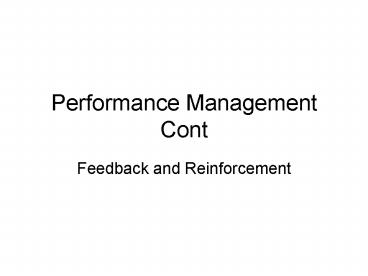Performance Management Cont - PowerPoint PPT Presentation
1 / 23
Title:
Performance Management Cont
Description:
Two elements Performance appraisal Reactive performance management ... or decrease the frequency of a behavior with unpleasant or pleasant responses ... – PowerPoint PPT presentation
Number of Views:65
Avg rating:3.0/5.0
Title: Performance Management Cont
1
Performance Management Cont
- Feedback and Reinforcement
2
Cases Dealing with Performance Management/Controll
ing
- Examples from
- Doug Durand (Ethics)
- Mary Martin (Perceptions)
- Consumate Materials
- Other
3
What are the tools a Manager has to deal with
controlling?
4
Motivation is one element
- Address Controlling aspect of management.
5
- Two elements Performance appraisalReactive
performance management - Add to that terminationpresentation on that
subject - Training/developmentproactive performance
management (More HR)
6
Today Reactive and Performance Appraisal.
- Reactive because provided AFTER performance
occurs (both good performance an poor
performance).
7
Largely talking about Formal Performance
Appraisals
- Assesses and provides feedback to employees on a
periodic basis depending on organizational
procedures. - One minute manager is great with informal
appraisals.
8
Debate
- Do you need formal appraisals?
- Use informalmore immediate and less threatening.
- Use formal--difficult to apply informal, general
patterns to discuss, long term issues to address. - Ideally combination
9
Ignore the forms
- Forms are important but more HR (mgmt 471 topic).
Different types of forms make it easier/more
difficult to give feedback. Especially forced
distribution.
10
Functions of Feedback
- Motivational
- Instructional
11
Ironically feedback is not always effective
- 38 of the time performance declines after
feedback. - Demotivational
- Book fails to address why.
- Perceptions/attributions Mary Martin
- Not focus on positives
- Feedback done in formal manner not personal
manner (4th one done today). - Feedback is judgmental not supportive linked to
pay
12
Ways to giving Feedback(Related to Hershey
Blanchard)
- Telling
- Selling
- Participative
- Telling does not work with good employees who are
willing and/or able
13
Giving negative feedback
- Unpleasant-video
- What was basic approach Telling, selling, or
problem solving. Why?
14
Some comments about giving feedback
- Work to get acceptance of feedback. It needs to
participatory in some ways. - Develop a sense of trust and minimize power
distance. - In giving negative feedback, be descriptive of
the problem. Gather information from
subordinate. Challenge is then
accept/reject/warn/work together.
15
- Feedback needs to be done at appropriate level of
frequency - When giving negative feedback, focus on
suggestions for improvements. - There should be no surprise in giving feedback.
Should summary what employee knows already. (mix
informal and formal).
16
More
- Relate feedback to goals
- Give specific tied to behaviors
- Focus on performance not personality
- Make sources of information credible and accurate.
17
Role play.
- Practice. So many supervisors have no
experience. - Observer Was it telling, selling or
participative. Explain. Did the person leave
with a clear sense of what they could do to
improve?
18
ReinforcementBehavior modification
- I suspect all of you know and understand Skinner.
- Increase or decrease the frequency of a behavior
with unpleasant or pleasant responses - Reinforcement increases the frequency
- Punishment and extinction reduce frequency
- See page 347
19
Applications to management
- New employees are critical. What do you do?
- How can you get indicators of someones
performance with constant direct monitoring? - Take two positionsCashier What does Cashier do
and how do you address without direct monitoring? - UPS truck driver. What behaviors do you monitor?
What can be done without direct monitoring?
20
- How do you address inappropriate behaviors.
Example, Cashier underages, customer complaints,
spending too much time gossiping with co-workers? - Loan officerLoan amounts, loan quality, not
communicate information to peers.
21
Issues with groups of employees Behavior
Modification
- Set up a system to ensure whole units operate
within capacities. - Examples Loggers and loads
- Safety on oil rigs
- Cashiers with rings per minute.
- Air shippers and Using cargo containers.
22
Steps
- Determine desired behavior by group(s) of
employees. - Find objective measurable indicator of the
behavior. - Monitor performance of that indicator (commonly
using information systems approach). - Chart it. Needs to be frequent (hourly, daily,
weekly). - Acknowledge good performance.
- No discussion of how to change. Just make change.
23
Apply it classroom instruction
- Pick behavior This will be a real challenge.































